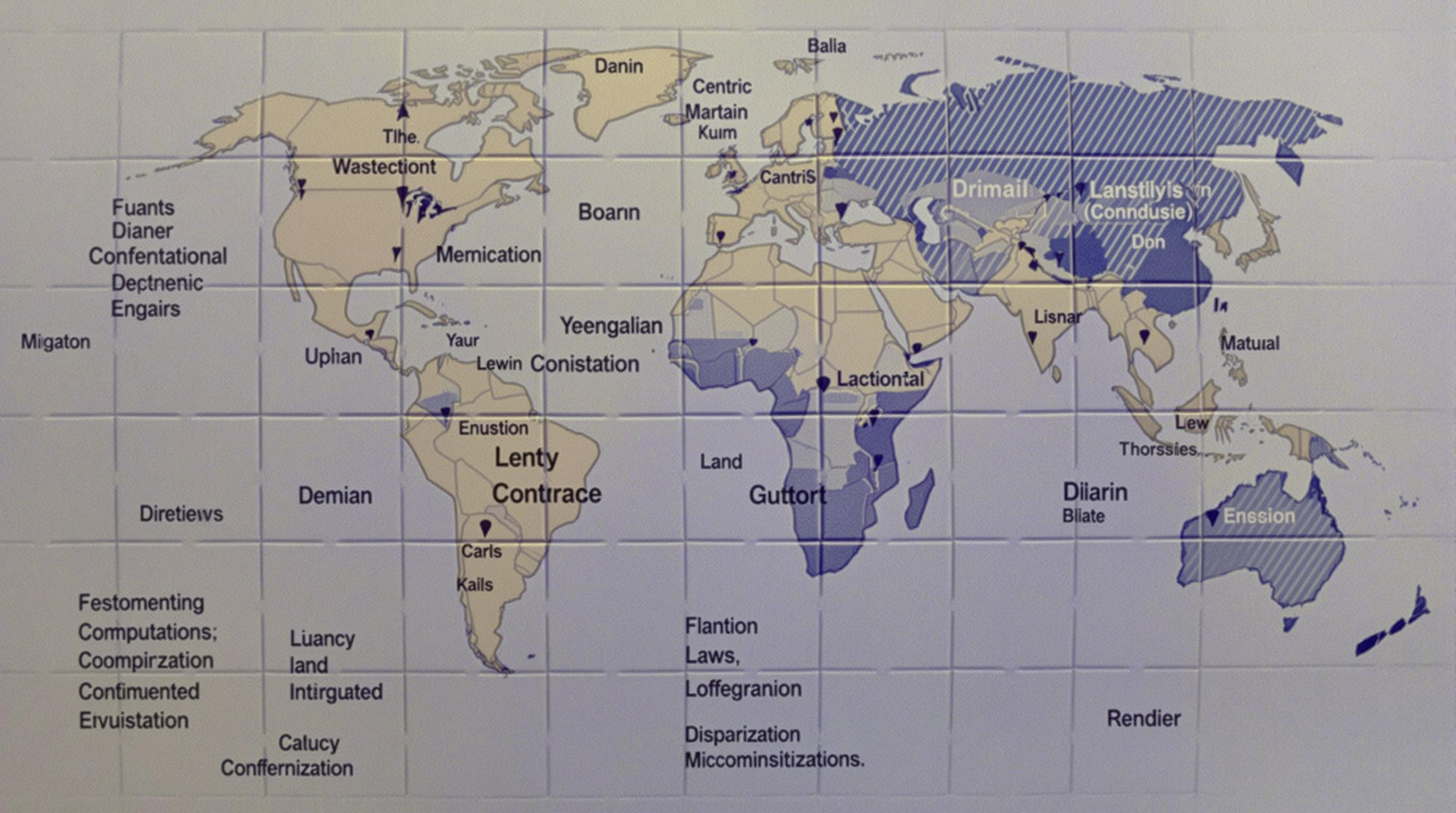Related Articles
- Redefining Boundaries: How Disruptive Innovation is Reshaping the Future of Legal Conflict Resolution
- The Future of Litigation: How Virtual Reality is Transforming Trial Preparation and Witness Testimony
- The Hidden Power of Narrative: Crafting Compelling Legal Stories Amidst Procedural Complexity
- Evolving Benchmarks: The Unexpected Impact of Pop Culture on Legal Precedents and Jury Perception
- Jurisdictional Jigsaw: How Globalization is Redefining Legal Practice and Client Representation in Uncharted Territories
- Legal Futures: The Overlooked Impact of Augmented Reality on Contract Negotiation and Dispute Resolution
Jurisdictional Jigsaw: How Globalization is Redefining Legal Practice and Client Representation in Uncharted Territories
Jurisdictional Jigsaw: How Globalization is Redefining Legal Practice and Client Representation in Uncharted Territories
Globalization is reshaping the legal landscape, pushing attorneys to navigate a complex web of jurisdictional challenges in uncharted territories. This article explores the dynamic interplay between globalization and legal practice, highlighting how new opportunities and challenges redefine client representation.
The Global Landscape of Legal Practice
Legal practice has entered a new era, one characterized by a dizzying array of jurisdictions and transnational laws. No longer confined to four walls of a local firm, lawyers now find themselves in a fast-paced environment where the reach of the law is global, and the implications are profound.
The Rise of Transnational Law
Transnational law is gaining traction as it encompasses both international treaties and the complex relations between private entities across borders. A striking example is the European Union's General Data Protection Regulation (GDPR), which has influenced privacy practices worldwide, even in countries that are not member states. It's estimated that approximately 66% of global businesses now comply with GDPR guidelines to ensure they can operate in the EU marketplace. This regulation serves as a stark reminder of how one jurisdiction can impact businesses worldwide.
Jurisdictional Challenges
Imagine a scenario where a tech startup in Silicon Valley faces legal actions from a client in Berlin due to a data breach involving personal data. This situation propels the startup into a legal quagmire where it must navigate both U.S. and EU laws, revealing a jurisdictional jigsaw puzzle that can become a costly endeavor if mishandled. Lawyers are now tasked with understanding various legal frameworks and how they intersect to provide robust representation for their clients.
Lawyers as Global Navigators
Today's lawyers must embody the role of global navigators, adept at steering through various jurisdictional waters. This shift is not just about compliance but also about foreseeing potential legal challenges in new markets.
Bob, a bright-eyed 27-year-old attorney who graduated from a top-tier law school, refers to himself as an “international lawyer in the making.” He recently partnered with a fintech company expanding into Southeast Asia and now spends hours analyzing regulatory requirements from multiple countries. "It feels like a game of chess, where each move requires careful consideration of implications and contingencies," he humorously remarked. Bob isn’t alone—young lawyers worldwide face similar learning curves as globalization shapes their careers.
Case Study: The Pharmaceutical Industry
The pharmaceutical industry is an arena particularly vulnerable to the challenges of varying jurisdictions. When Johnson & Johnson faced legal action over defective products distributed in both the U.S. and South Africa, the company had to navigate different legal standards, enhancing their legal team’s skills in managing diverse regulations effectively. This situation illustrates the pressing need for legal practitioners to build a more adaptable and globally aware practice.
Communication & Cultural Competence
With globalization comes an inherent need for enhanced communication skills. Lawyers must not only be knowledgeable about different laws but also culturally aware. Engaging clients from diverse backgrounds requires sensitivity to their unique contexts, rather than a one-size-fits-all approach. For instance, understanding cultural attitudes towards dispute resolution can be crucial—what works in U.S.-based negotiations may be seen as overly aggressive in Asian markets.
Opportunities in Uncharted Territories
Globalization, while methodically revealing new challenges, also presents a buffet of opportunities for legal practitioners. For young lawyers, the potential to specialize in niche areas such as international human rights law, environmental law, or technology law is particularly appealing.
Consider the case of a group of young lawyers who established a non-profit organization that focuses on providing legal aid to marginalized communities victimized by corporate exploitation in developing countries. They effectively utilized social media platforms to raise awareness and gather support from the global community, demonstrating innovative methods to build a network of advocates worldwide.
Legal Technology’s Role
Legal technology is a game changer in bridging jurisdictional gaps. Technologies such as blockchain, artificial intelligence, and legal research tools can expedite processes and enhance accuracy, offering legal professionals newfound efficiency in their practices. A survey conducted by the American Bar Association in 2021 indicated that about 75% of lawyers believe that legal technology has simplified their work. This embraces the changing landscape of how law is practiced, making it essential for lawyers to adapt or be left behind.
But Is It Sustainable?
One must pause to ponder how sustainable this rapid evolution is. As law firms further invest in technology and global outreach, there is an increasing concern about how well they can manage the ethical implications of their work. The recent controversy over technology companies and data privacy violations showcases the necessity for lawyers to remain vigilant, balancing innovation with ethical responsibilities.
A casual observation by a fellow attorney sums this up: “Unless you have a full-time ethics officer on your team, you might find yourself in a precarious position!”
Adaptation and Learning
As with any transformative journey, the key to thriving in this global legal environment is adaptability. Establishing a mindset of continuous learning can make all the difference. Lawyers now participate in cross-border training programs, attend global legal conferences, and even engage with international peers via platforms like LinkedIn or Zoom.
Moreover, organizations such as the International Bar Association (IBA) have begun to emphasize the importance of providing legal practitioners with resources and educational opportunities that focus on emerging global issues, enabling lawyers to stay updated with the dynamic legal environment.
The Voice of the Future
The intersection of globalization and legal practice represents a bright future for a new generation of lawyers. With emerging practices like digital assets and online dispute resolution gaining traction, young attorneys stand at the forefront of transforming legal systems to fit an interconnected world. The potential for innovation in legal practice will likely foster new careers that were unimaginable a few decades ago.
Reflecting on the journey, Morgan, a 23-year-old recent law school graduate, expressed optimism: “We're no longer confined to our local towns. We can help people on the other side of the globe, tackling global challenges as one.” Such sentiments encapsulate the adventurous spirit of today's legal practitioners ready to navigate the tides of globalization.
A Call to Action
The landscape for legal practice is indeed a jurisdictional jigsaw, and the pieces are constantly shifting. Law firms must cultivate an adaptive approach, not only to embrace globalization but also to uphold ethical practices within their frameworks. As members of the legal community, it is our responsibility to stay informed, engage with novel practices, and uphold our commitment to justice—and that challenge is as exhilarating as it is daunting.
Conclusion: The Legal Adventure Ahead
In conclusion, globalization is more than just a trend—it’s a transformation redefining legal practice in unprecedented ways. For both seasoned professionals and fresh talent, understanding and navigating this terrain will be crucial for future success. Embrace adaptability and the potential for continuous learning, and one's legal journey could very well become an exciting adventure in an uncharted legal landscape.
As the world evolves, the role of lawyers will metamorphose with it. The next generation of attorneys will not only lead the way but will also shape how justice is served across borders. It’s not only a legal obligation; it’s a call to adventure.




